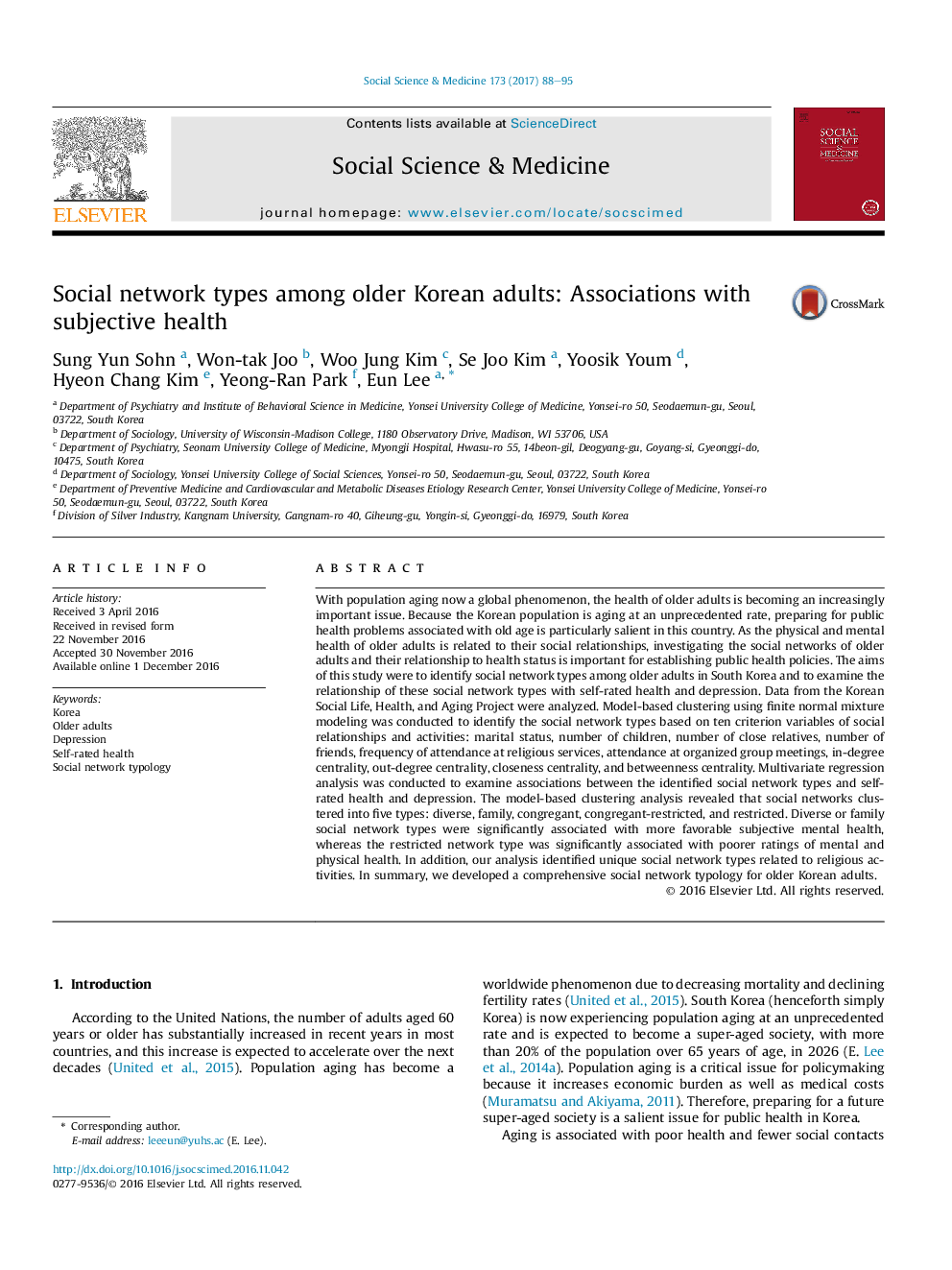ترجمه فارسی عنوان مقاله
انواع شبکه های اجتماعی در میان بزرگسالان بزرگ کره ای: انجمن هایی با سلامت ذهنی
عنوان انگلیسی
Social network types among older Korean adults: Associations with subjective health
| کد مقاله | سال انتشار | تعداد صفحات مقاله انگلیسی |
|---|---|---|
| 127533 | 2017 | 8 صفحه PDF |
منبع

Publisher : Elsevier - Science Direct (الزویر - ساینس دایرکت)
Journal : Social Science & Medicine, Volume 173, January 2017, Pages 88-95
ترجمه کلمات کلیدی
کشور کره، بزرگسالان سالمند، افسردگی، سلامت خود ارزیابی، نوع شبکه اجتماعی
کلمات کلیدی انگلیسی
Korea; Older adults; Depression; Self-rated health; Social network typology;
ترجمه چکیده
با پیری جمعیتی که اکنون یک پدیده جهانی است، سلامت افراد مسن در حال تبدیل شدن به یک مسئله فزاینده مهم است. از آنجایی که جمعیت کره ای با نرخ بی سابقه ای پیر می شود، آماده سازی برای مشکلات بهداشت عمومی مرتبط با سن، به ویژه در این کشور برجسته است. همانطور که سلامت جسمی و روانی سالمندان بزرگتر مربوط به روابط اجتماعی آنهاست، بررسی شبکه های اجتماعی افراد مسن و ارتباط آنها با وضعیت سلامتی برای ایجاد سیاست های بهداشت عمومی مهم است. هدف از این مطالعه شناسایی انواع شبکه های اجتماعی در میان افراد مسن در کره جنوبی و بررسی ارتباط این نوع شبکه های اجتماعی با سلامت خود و افسردگی است. داده های زندگی اجتماعی، بهداشت، و پروژه پیری کره ای مورد تجزیه و تحلیل قرار گرفت. خوشه بندی مبتنی بر مدل با استفاده از مدل سازی محدود مختلط نرمال برای شناسایی انواع شبکه های اجتماعی بر اساس ده معیار متغیرهای روابط و فعالیت های اجتماعی: وضعیت تاهل، تعداد فرزندان، تعداد بستگان نزدیک، تعداد دوستان، فراوانی حضور در خدمات مذهبی ، حضور در جلسات گروهی سازماندهی، مرکز مرکزیت، مرکز خارج از مرکز، مرکز نزدیک و مرکز بینابینی است. تجزیه و تحلیل رگرسیون چند متغیره برای بررسی ارتباط بین انواع شبکه های اجتماعی شناسایی و سلامت خود و افسردگی انجام شده است. تجزیه و تحلیل خوشه ای مبتنی بر مدل نشان داد که شبکه های اجتماعی به پنج نوع تقسیم می شوند: متنوع، خانواده، اجتماع، محدود و محدود. انواع شبکه های مختلف اجتماعی و خانوادگی به طور معنی داری با سلامت روان تر نسبت به ذهنی ارتباط دارد، در حالیکه نوع شبکه محدود شده با ارزیابی ضعیف تر سلامت روان و جسمی ارتباط معنی داری دارد. علاوه بر این، تجزیه و تحلیل ما انواع مختلف شبکه های اجتماعی مربوط به فعالیت های مذهبی را شناسایی کرد. به طور خلاصه، ما یک طبقه بندی جامع شبکه اجتماعی را برای بزرگسالان کره ای بزرگتر توسعه دادیم.

